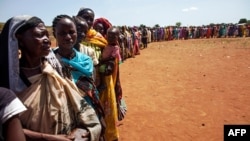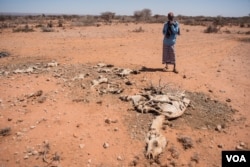United Nations Secretary-General Antonio Guterres warned Wednesday that 20 million people in four countries face famine unless the international community steps in to prevent it.
"The situation is dire," Guterres told reporters. "Millions of people are barely surviving in the space between malnutrition and death, vulnerable to diseases and outbreaks, forced to kill their animals for food, and eat the grain they saved for next year's seeds."
The United Nations has declared South Sudan, Somalia, Yemen and the northeastern part of Nigeria on the brink of famine in the next six months. The world body already has declared that about 100,000 people in two counties of South Sudan's Unity State currently are coping with famine.
"Famine is already a reality in parts of South Sudan. Unless we act now, it is only a matter of time until it affects other areas and other countries," Guterres said. "We are facing a tragedy; we must avoid it becoming a catastrophe. This is preventable if the international community takes decisive action."
He said a staggering $4.4 billion is needed by the end of March — just four weeks away. For the entire year, a total of more than $5.6 billion is needed for these four countries. The U.N. is ready to step in, but needs the funds to do it.
Worryingly, Guterres said the United Nations has only received $90 million — just two cents for every dollar required.
"The lives of millions of people depend on our collective ability to act," he said. "In our world of plenty, there is no excuse for inaction or indifference."
Guterres said a combination of factors have thrown these regions into an acute food crisis — mainly the combination of conflict and severe drought accelerated by climate change.
Famine is a technical term that requires certain thresholds to be met before it is declared. The last time the U.N. declared a food crisis so severe was in 2011 in Somalia.
"The lesson from the 2011 Somalia famine was, by the time that we declared famine broadly as a world, half those who died had already died," U.N. humanitarian chief Stephen O'Brien said. "This is why we are sounding the alarm now, so that we can actually make the difference to avert the catastrophe."
Disaster by the numbers
- Throughout South Sudan, almost 5 million people desperately need food; famine has already been declared in two counties; 1 million people are on brink of famine; 270,000 children are suffering severe acute malnutrition.
- Across North-East Nigeria, some 5.1 million people face serious food shortages; nearly half a million children are suffering severe acute malnutrition.
- 2.9 million people in Somalia urgently need food and livelihood assistance; 185,000 children are suffering acute malnutrition.
- Yemen is facing the largest food insecurity emergency in the world, with an estimated 7.3 million people needing help now.
- The United Nations has scaled up its response in all four countries: In Northeast Nigeria, humanitarians are reaching more than 2 million people with food assistance. In South Sudan, the United Nations and its humanitarian partners aim to assist 5.8 million people this year; in Somalia, 5.5 million people, and in Yemen, 8.3 million.
Source: United Nations






